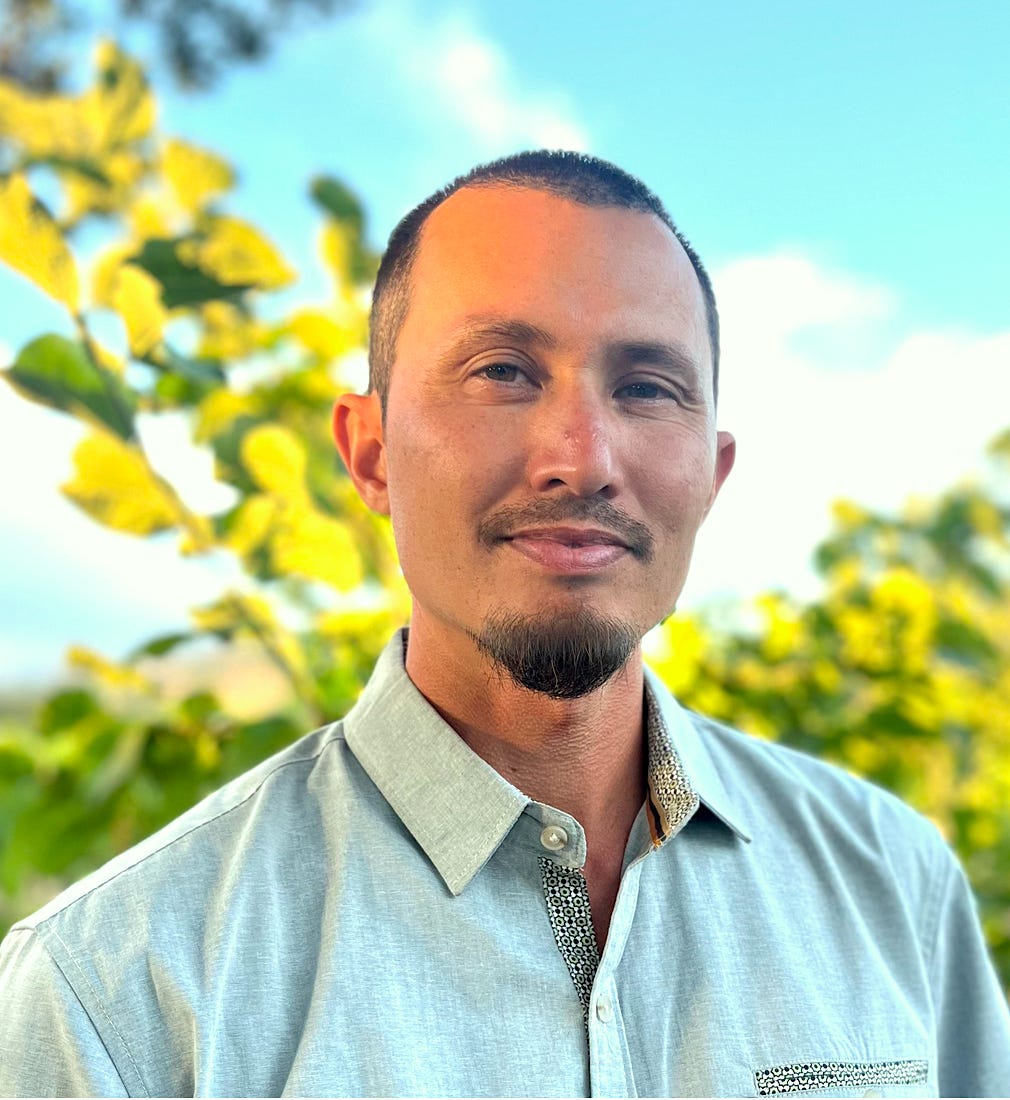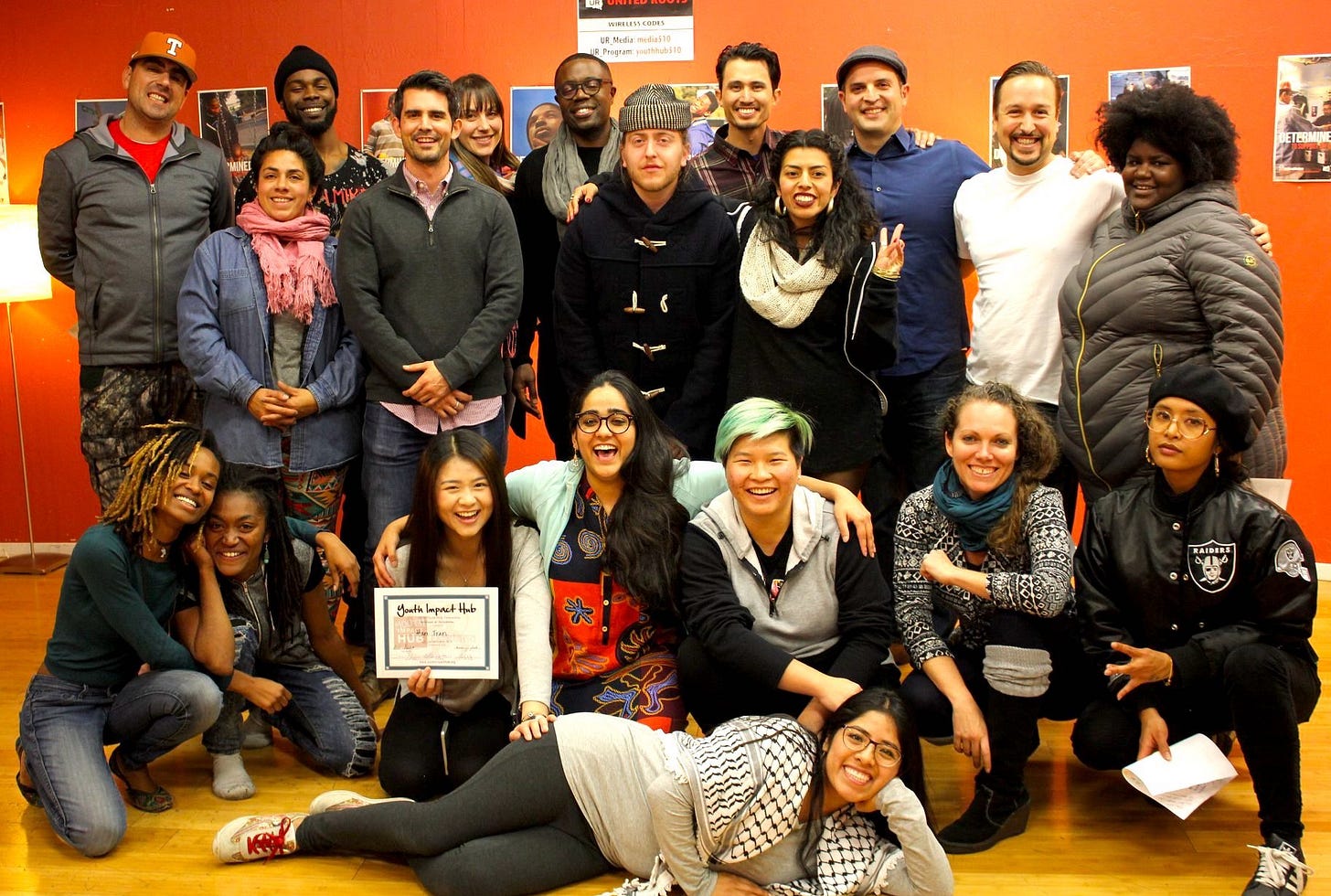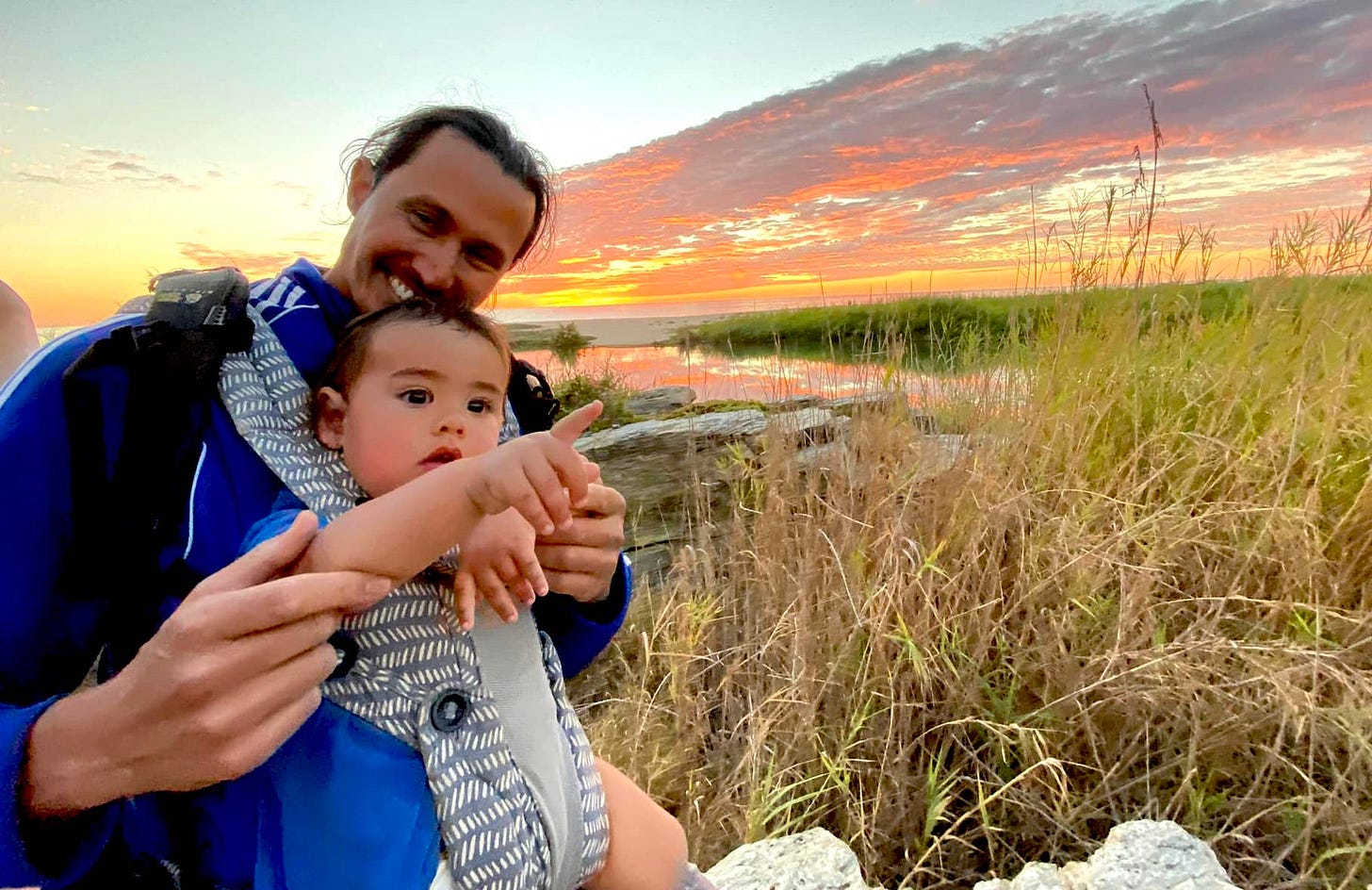Gino Pastori-Ng: Vulnerability in the Midst of Struggle
Healing Conversations from the Front Lines of Activism
Greetings Friends. This month’s Healing Conversation features writer, activist, and hip-hop artist Gino Pastori-Ng. His journey has taken him from working with young people in Oakland, to discovering his ancestral home in China, to the transformative practice of parenting his three-year-old son.
As a teenager growing up in East Oakland in the 1990s, Gino Pastori-Ng turned to freestyle rap as a form of creative expression. It helped him survive, and became what he describes as a lifelong tool for healing and connection.
I met Gino when he was co-director at Youth SEED (Youth Social Entrepreneurship for Equitable Development), an organization he co-founded in 2013 that later became Youth Impact Hub Oakland. Believing that the people most impacted by a problem are the ones best equipped to create innovative and sustainable solutions, these organizations provided low-income young people of color with mentorship, small business training, and seed funding to launch businesses that solve a community problem. This kind of support – asking young artists and entrepreneurs what they want to create, and assisting them in doing it – was what he wished he’d had as a young person. Beyond the businesses they helped to launch, the organization offered participants a sense of belonging and purpose, encouraging collaboration among them in a way that built community.
Given the focus of our conversation on healing in the context of activism, I begin by asking Gino how he sees the relationship between justice and healing. “They are inseparable,” he replies. “Anyone who wants justice in the world, I think what they really want is for everyone and everything to have the opportunity to be healed and well. And the work of creating justice cannot be done without personal healing. So for someone who wants to be a lifelong activist – or doing any kind of work toward a more equitable, compassionate, living world – personal healing has to be a constant commitment in order to sustain that work. One can’t happen without the other.”
Like many grassroots organizations, Gino and his co-workers had their share of interpersonal conflict. He recounts a time when things got so intense, they brought in a facilitator to guide them in a restorative justice process. “For a few days, all the staff sat in a room and we talked about what was happening and how we felt about it. I think what stood out most to me is that we actually took the time to slow down and listen to each other. We got to see, not just the reactions that people were having on a daily basis, but what were the reasons for those, and the background stories that created those behaviors. I think it developed a lot of compassion where everyone felt, okay, I actually see where you're coming from, and why you're behaving this way. I still might not agree with what you're doing, but I understand where it's coming from. So we were able to move forward in a functional way, and to demonstrate to the young people that we were committed to that process, that we were walking the talk, because we also had a lot of restorative justice circles for the youth.”
As he speaks, I can’t help wondering what a difference that kind of listening to one another across conflict – listening to one another’s pain and fears, stories and dreams – might make in so many settings. I ask Gino what he learned in that process that could be valuable to others. He thinks for a moment before answering, “I would say that the shortest distance between two points is not a straight line – as the linear, ego mind would like to believe. Sometimes slowing down and completely stopping can actually lead to getting to the destination quicker, rather than just trying to plow through. The other thing I would say is that vulnerability is powerful. When we're trying to protect ourselves and wear our mask of impenetrability, and not be affected by anything, then disconnection happens and conflict happens.”
“When we can be vulnerable,” he continues, “like in this restorative justice circle, it opens up a deeper opportunity for trust and compassion for each other. Even though it can be scary to be vulnerable in that way, that's how real connection can happen. When there's conflict, if there isn't that real connection, there is not the desire to work through it. So, until people can open up some level of vulnerability, it's going to be very hard to repair those conflicts. Slowing down, in the short term might seem like a setback, but in the long term makes the work more sustainable.”
One of the things that impressed me most about the organizations Gino was involved with is how they integrated healing into the daily life of their operations. So often, if sustainability is addressed at all, it’s a matter of somebody taking time away to heal and then coming back into the same pain that was there when they left. Gino and his comrades supported sustainability in a variety of ways.
He recalls, “we had weekly yoga. And for a long time, there was a weekly freestyle dance session where there would just be music blasting, and whoever showed up could dance their heart out. As a staff, we had a monthly fun day where we would go and do something fun together – which was hard to justify in terms of activist culture, when there's all these constant crises happening, to invest that time in actually connecting with each other and having fun. We’d bring food to our staff meetings, and we'd have very long check ins, just about personal issues. I felt it was valuable to invest the energy into creating space for people to show up as their whole selves, even if it was challenging at times.”
Those whole-person relationships were essential in navigating the tremendous loss and grief that was a frequent occurrence in their frontline work. I ask Gino if he’d be willing to speak about this. He takes a deep breath, “the grief was pretty constant. I mean, there was probably never a period of more than a few months when there wasn't a young person who either was directly part of our center, or was a friend of someone in our center, who was killed. So there was a constant stream of grief.”
When you entered the building – a space shared by staff and the young people they served – there was always an altar. It was a way to honor and presence those who had died. Gino says, “I remember it was challenging at times to walk in the building and be reminded of what had happened, but I think it was important to feel that and not ignore it.”
I ask how the young people responded – if it was triggering to them, or comforting to have that space. Gino’s answer was revealing: “I found in general the young people, on one level, are just more accustomed to grief. More habituated to like, this is something that happens – people leave their bodies. And on another level, I think they’re more spiritually evolved, I would say, as a generation – at least the young people I was working with. I could feel them being more tapped into the big picture of life. Knowing about death not being the end, but continuing to feel a connection to those that had passed, and knowing that they're not gone but they're just in a different form.”
I ask Gino what wisdom he would share with folks newer to activism that he wishes he had known earlier. He smiles, “well, I think of your mentor, Howard Thurman. I believe the quote is, ‘Don’t ask what the world needs, ask yourself what makes you come alive and do that, because what the world needs is people who have come alive.’ For a long time I was trying to think, with my mind, what does the world need? And it's still a work in progress to trust my body wisdom of what am I actually being called to, and doing that. So I would say following those words, and constantly working on developing mindfulness and intuition, to actually know what we are being called to create, and not just trying to follow logic, because the problems that we're facing are not going to be solved with logic only.”
Gino also emphasizes the importance of intergenerational collaboration. Not only the mentorship he and his colleagues offered to the young people in their programs, but his generation’s need to be in relationship with elders. He reminds me about a convening for the Oakland Peace Center where he and I really connected, and my offer to support him. He confessed, “what I did not realize is how much I needed the kind of mentorship you were offering, which was not how to launch a social entrepreneurship organization, but how to be well in my spirit, and hear what I'm being called to create. I think every person needs that, particularly younger people who are stepping into their activism. We need the advice and guidance of those who have been in it for longer – not to tell us what to do or how to do, but to support us in whatever we try to do within that.”
These days Gino’s activism consists of facilitation, writing, and being a stay-at-home dad to his three-year-old son. He notes, “when I was younger, I had this sense that to be an activist, I needed to put my body on the line and, like, do these radical public visible things to show other people that I'm an activist. That was what fueled a lot of my work earlier in life. And now, as a father, I'm seeing how breaking it down to the smallest aspects of how I interact with my son can be activism.”
It took Gino a while to acknowledge the work he is doing now as a form of activism. I get it. It’s amazing how many of us disqualify ourselves because we don’t think we’re doing enough, or we don’t fit the stereotypical idea we have for what “activism” means. But there are many ways to contribute to the transformation of consciousness, social structures, and relationships that can move us closer to the world we long for.
Gino says, “Being a father has absolutely been the most challenging and humbling experience of my life. I have dedicated most of my adult life towards healing and self awareness, and yet nothing prepared me for the emotional anguish that arrived with the birth of my son. I was forced to surrender my notions of who I thought I was, break out of the illusion that I don’t need help from anyone, and attempt to address the shameful and inconvenient parts of myself that I would have preferred to keep hidden forever.”
As he has been learning about child development and working with his own childhood and ancestral trauma, Gino sees how many of the larger issues we struggle with as a society are related to historical patterns of wounding. He believes parenting can be engaged in a way that supports a shift in that trajectory of injustice. Gino describes his vision as “a global culture of loving compassion for all beings, where all children feel that they are loved and wanted and belong in this world, and that their voice and opinion matters. That they each have a specific gift to bring to this world, and that they are supported in manifesting it. And in concrete terms, an economy that is based on the health of ecosystems, and yeah, people who are in power, not because they're greedy, or trying to mask their sense of self hatred, but because they are lovingly in service.”
I’m curious, now that Gino has left the structure of the nonprofit world, about his practices for sustainability. The first thing he says is hugs, especially hugs from his son. And also, now living on semi-rural land, Nature. He and his wife have begun creating a permaculture food forest around their home. He tells me, “Being immersed in nature is tremendously healing. Getting outside, hugging a tree, getting my bare feet on the ground, feeling the sun. And in the process of parenting, probably the most important practice for me has been writing. That's taken the shape of journaling, and songwriting. And now I'm writing this book, Tiny Guru, which is the memoir of my fathering experience. Writing is a very long journey of digesting and processing, and so I've really had to re-live a lot of my most embarrassing, painful, and shameful moments over and over again in the process. That's been tremendously healing, to actually compost that and move through it, and not just be stuck in it.”
Gino describes the power of journaling this way: “Whenever I'm thinking about a big question that I can't seem to solve, if I go back and read my journal entries of the previous month, the answer is there.” He also still practices the freestyle rap that helped him survive earlier in life, describing it as a form of spontaneous verbal journaling. “I find that in freestyle rap, some of the most important lessons for me to learn come through when I'm not trying to control what I'm saying, or how people are gonna think about it, but just opening myself up to the flow.” (You can hear some of his work HERE, under his performance name IM1, or InstruMental One.)
At the root of what inspires Gino to do the work he does, and the thing that gives him hope, is his faith in Life. He explains, “my mind does not understand how we're going to get out of this mess that we're in as a species, and yet my spirit knows that we will. I don't know how it's gonna happen, or exactly what my role is in that, but I know from moment to moment, I'm being given instructions on how I'm supposed to contribute. For a chapter of time, that was as co-founder and co-director of Youth Impact Hub. In this moment, it's providing the best compassionate love for my son that I possibly can. I'm sure in another chapter there'll be new things. Also in this moment, it's the emergence of this book that chronicles my very painful lessons learned as a father, and all the emotional wounding of my past and my ancestors that are impacting the way I'm able to show up as a parent. And to put that story out into the world as an offering, to hopefully inspire other people. So, I continue listening for what is asking to be birthed through me, and having faith that it is enough.”
***
To learn more about Gino’s work visit:
Gino’s website, including his blog with stories from his book-in-progress: https://www.ginopastoring.com
SoundCloud Mixtape with Gino’s music: https://soundcloud.com/i_m_1
In 2015 Gino had the opportunity to visit the village in rural China where his grandfather was born, and find what remained of their ancestral home. (You can read about it here: http://www.friendsofroots.org/gino ) This video and song “Remember the Source” captures the power of that journey:






